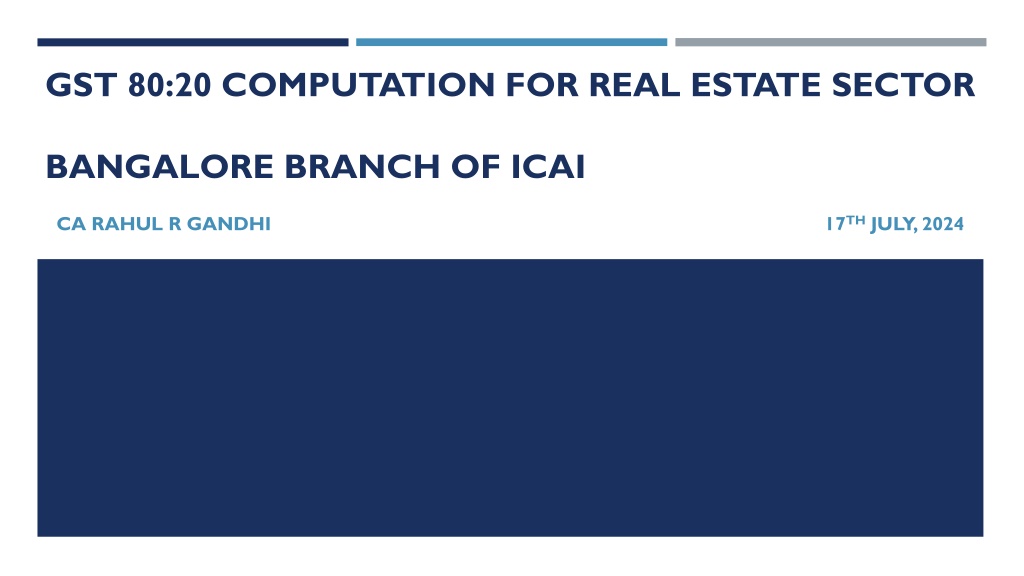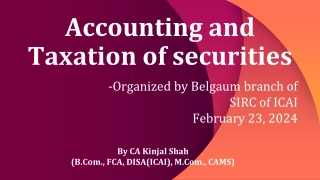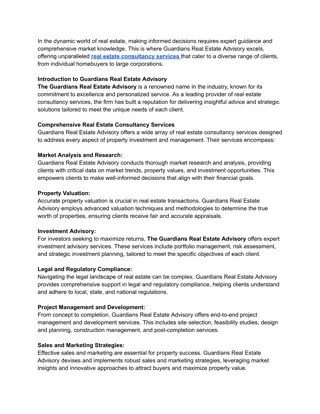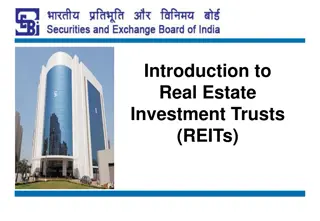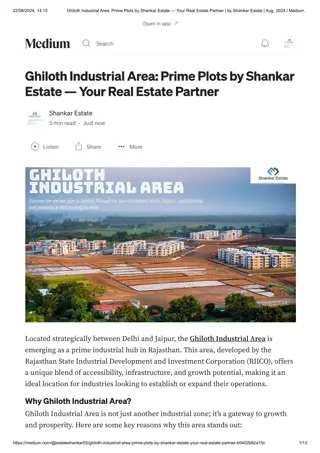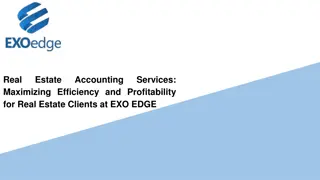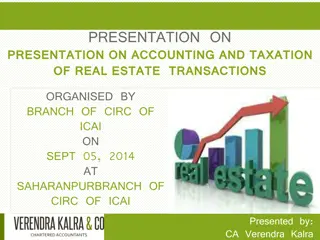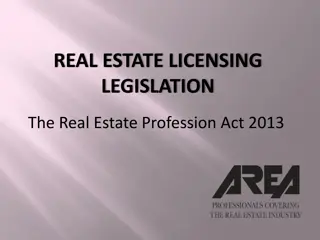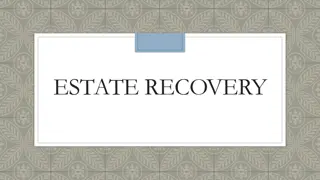Computation for Real Estate Sector in Bangalore Branch of ICAI
Practical overview of GST computation for real estate transactions in Bangalore, with details on old rates with ITC and new rate regime effective from April 1, 2019. The content discusses different transactions, conditions for new rates without ITC, and provides insights on the 80:20 computation method.
Download Presentation

Please find below an Image/Link to download the presentation.
The content on the website is provided AS IS for your information and personal use only. It may not be sold, licensed, or shared on other websites without obtaining consent from the author. Download presentation by click this link. If you encounter any issues during the download, it is possible that the publisher has removed the file from their server.
E N D
Presentation Transcript
GST 80:20 COMPUTATION FOR REAL ESTATE SECTOR BANGALORE BRANCH OF ICAI CA RAHUL R GANDHI 17THJULY, 2024
Background - Different transactions in real estate sector Old rate Vs New Rate Regime (NRR) Practical overview of transaction SYNOPSIS Conditions for NRR Practical approach for 80:20 computation FAQ s Practical issues in complying with 80:20 Rule QnA & Thankyou 2
Sale of Land Sale of Land & building Self Construction BACKGROUND (TRANSACTIONS) Works Contract Plotted Development Joint Development Agreement Illegal Construction Redevelopment Approved Resolution Plan 3
OLD RATES WITH ITC BEFORE 1/4/2019 GST Rates for Builder PMAY 8% Other Real Estate 12% 1/3rd Land Deduction 1/3rd Land Deduction 12% * 2/3 18% * 2/3 4
NEW RATE REGIME (NRR) W.E.F 1/4/2019 GST Rate NRR Pure Commercial Projects 12% with ITC Affordable 1% - No ITC Residential 5% - No ITC 1/3rd Land Deduction 1/3rd Land Deduction 1/3rd Land Deduction 1.5% * 2/3 7.5% * 2/3 18% * 2/3 5
PRACTICAL OVERVIEW OF TRANSACTION Developmental Rights Builder Land Owner Construction services 60 Flats 40 Flats Before Construction +LO 40 share After OC Before Construction After OC 25 Sold 12 Sold 3 remaining unsold 45 Sold 5 remaining unsold 10 Sold Remit GST with ITC Reversal of ITC basis - carpet area sold/unsold No GST - Sch III: Development right RCM Remit GST w/o ITC
CONDITIONS FOR THE NEW RATES WITHOUT ITC Composition Scheme Applicability Paying of GST is only in cash ITC not permitted ITC: Residential Real Estate Projects JDA TAX : No ITC on the future purchases Report ITC not availed as ineligible credit in GSTR-3B [No. 4 (D)(2)] Reversal/availment of Excess ITC as on 31st March 2019 as per (Annexure I in the case of REP other than RREP and in Annexure II in the case of RREP) Tax on Development Rights to be paid by Builder on RCM basis.
CONDITIONS FOR THE NEW RATES WITHOUT ITC Excess URP Tax - RCM u/s 9(4) for Purchases from Unregistered Persons 1) Procure 80% inputs and input services from registered vendors other than TDR, long term lease premium, salami, FSI , electricity, high speed diesel, motor spirit, natural gas 2) Shortfall beyond 20% to be assessed and paid projectwise by JUNE of next Financial YEAR 3) RCM Payments - 9(3) deemed as Registered Purchase classified under 80% bucket 4) Purchases >20% from URP to be paid tax at 18%, 5) CEMENT / CAPITAL GOODS Purchased from URP to be paid under RCM irrespective of % threshold on monthly basis at the applicable rates.(Currently 28% for cement)
RCM U/S 9(4) NN 7/2019 CT(R)-Sec 9(4) Recipient of goods & services S.No Category of supply of goods and services Supply of such goods and services or both [other than TDR & upfront premium] which constitute the shortfall of 80% 1 Promoter 2 Cement falling in chapter heading 2523 Promoter Capital goods falling under any chapter in the first schedule to the Customs Tariff Act, 1975 3 Promoter
RCM U/S 9(4) NN 8/2019 CT(R) - Goods Sl No Chapter Description Rate of Tax Supply of any goods other than capital goods and cement, by an unregistered person to a promoter for construction of the project on which tax is payable by the promoter U/s 9(4) Overrides the any specific chapter or heading which is covered 9% 452Q Any chapter NN 3/2019 CT(R) - Services Sl No Chapter Description Rate of Tax Supply of Input services other than TDR, FSI, Upfront Premium- to the extent of 80%. 9% 39 99 Overrides the any specific chapter or heading which is covered
6 STEPS PRACTICAL APPROACH FOR 80:20 COMPUTATION Identification of I & IS 1 Identification of Supplier of I & IS 2 Whether used for supplying the services 3 Apply 80:20 rule Calculate Excess URP Tax 4 Discharge tax on excess URP beyond 20% 5 Have the above details on Project wise - FY wise - GSTIN wise 6
STEP 1: IDENTIFICATION OF I & IS Inputs Capital goods? Excluded from calculation & applicable to RCM irrespective of quantum on monthly basis Cement Included in calculation & applicable to RCM irrespective of quantum on monthly basis Other inputs Other goods - included in calculation & computation and discharge tax yearly Inputs service Service - whether capitalised or not - included What about salaries paid? Is it I or IS? These are neither G/S therefore excluded from computation (FAQ) Take away: Sch III transactions are all excluded from computation Segregation of total cost into CG, Cement, Other than Cement, IS, Sch III & others Exclude Development Rights, Lease Payments, FSI, Electricity, HSD, Motor spirit, gas
STEP 2: IDENTIFICATION OF SUPPLIER OF I & IS Registered or Unregistered? Unregistered Turnover below the threshold Not engaged in any supply/business activity Exclusively exempt supply Exclusively RCM supplies Retrospective cancellation? Whether RP or URP? Approach 1: Treat as URP Approach 2: Treat as RP Already tax has been discharged No provision for True-up as in Rule 42 (based on change in registration status)
STEP 2: IDENTIFICATION OF SUPPLIER OF I & IS Departments perspective : Summary approach Limitation: Incorrect reporting errors from supplier not captured (like B2C, incorrect GSTIN, incorrect value etc) Proactive approach to mitigate: RE Promoter to have expense register with corresponding GSTIN, general practices on reconciliation & followup.
STEP 1 & STEP 2 Example 1 URP: 15% Is it Cement? Yes, pay RCM on 15 @28%
STEP 1 & STEP 2 Example 2 URP: 20% Is it Cement? No
STEP 1 & STEP 2 Example 3 URP: 20% Is it Cement ? Yes, pay RCM on 15 @28% Other than Cement? Yes, pay RCM on 10 @18%
STEP 3: WHETHER USED FOR SUPPLYING THE SERVICES Most critical & important step i) I/IS related to business activity or used in construction service? Used for supplying the service = Construction service Supplier engaged in Multiple activities like plotted development, other taxable/Non-taxable ..etc. Supporting provision: maintain projectwise accounts & discharge yearly
STEP 3: WHETHER USED FOR SUPPLYING THE SERVICES Should it be directly or indirectly related to construction ? Rate/Exemption notification: construction service RCM notification: Excess procurement for the purpose of construction of project Therefore 2 conditions i.e., I/IS should be Used for supplying the construction service AND Used for construction of project = Construction cost Included Eg: Civil construction cost, Common amenities cost Directly (Part of construction service) Related to Construction cost? Included Eg: Marketing cost, Government related cost Indirectly
STEP 3: WHETHER USED FOR SUPPLYING THE SERVICES Total Cost = 10 Crore Construction related 8 crore Business activity related 2 crore Included Excluded Direct expense of construction services of residential flats Indirect expense related to particular RREP Head Office Expense
STEP 5: DISCHARGE TAX ON EXCESS URP BEYOND 20% i) Whether exempt supplies form part of 80:20? Illustration Issue: Increase in RCM liability for the RE Promoter Same transaction viewed differently from suppliers angle (exempt) & recipient angle (Taxable under RCM)
STEP 5: DISCHARGE TAX ON EXCESS URP BEYOND 20% Rate notification vis-a-vis Exemption Notification Conservative approach To include the said supplies under 80:20 and pay tax on the same Aggressive approach Legal reference i) Overriding this notification - Implies only rate noticition i.e., 1/2017 (Goods) & 11/2017(Services) ii) Absence of mechanism to claim tax on exemption Explanation. This entry is to be taken to apply to all services which satisfy the conditions prescribed herein, even though they may be covered by a more specific chapter, section or heading elsewhere in this notification.
STEP 5: DISCHARGE TAX ON EXCESS URP BEYOND 20% ii) Interplay of 9(3) & 9(4) provisions? Illustration
STEP 5: DISCHARGE TAX ON EXCESS URP BEYOND 20% RE Promoter (Builder) Excess URP No Excess URP Should you pay tax for supplies u/s 9(3)? Aggressive Approach No Conservative Approach Yes Both notification operate together 9(4) specific to RE promoters Further this is new entry post the entry in 9(3) 9(3) being specific entry RCM notification not intended to grant exemption to previously existing RCM liability Harmonious Interpretation
STEP 6: DETAILS ON PROJECT - FY - GSTIN WISE Year 3 Year 1 Year 2 Year 4 Project Launch 10% flats booked Under construction 40% booked Upto OC 80% booked Post OC 80:20 Rule Not Applicable 80:20 applicable to expenses of Year 1 80:20 applicable to expenses of Year 2 80:20 applicable to expenses of Year 3 Non-applicability Post Occupancy certificate Calculation of threshold independent for each year and no carry forward of expenses during lifecycle of project Note: Computation - Projectwise Yearwise & NOT Year to Date wise
FAQS ISSUED BY CBIC 1. If value of purchases as prescribed above registered supplier is less than 80%, what would be the applicable GST rate on such purchases? Promoter has to pay GST @ 18% on reverse charge basis on all such inward supplies (to the extent short of 80% of inward supplies from registered supplier) except cement on which tax has to be paid (by the promoter on reverse charge basis) at the applicable rate, which at present is 28% (CGST 14% + SGST 14%) from
FAQS ISSUED BY CBIC 2. In case of new rate of 5% / 1%, whether the conditions of payment of tax through Cash Ledger, payment of tax under RCM subject to 80% limit, nonavailing of Input Tax Credit, reversal of credit, maintenance of project wise account, reporting of ITC not availed in corresponding GSTR-3B required to be complied mandatorily by the Developer ? Yes. All the specified conditions against clause (i) to (id) of Sl. No 3 of Notification No. 11/2017CTR are mandatory. etc. are
FAQS ISSUED BY CBIC 4 The condition in Notification No. 3/2019 specifies that 80% of inputs and input services should be procured from registered person. expenditure such as salaries, wages, etc. These are not supplies under GST [Sl. 1 of Schedule III]. Now, my question is, whether such services will be included under input services for considering 80% criteria? Services by an employee to the employer in the course of or in relation to his employment are neither a goods nor a service as per clause 1 of the Schedule III of CGST Act, 2017. Therefore, salaries and wages paid by promoter to his employees will not be relevant for the minimum purchase requirement of 80% . What about
FAQS ISSUED BY CBIC 4 The condition in Notification No. 3/2019 specifies that 80% of inputs and input services should be procured from registered person. expenditure such as salaries, wages, etc. These are not supplies under GST [Sl. 1 of Schedule III]. Now, my question is, whether such services will be included under input services for considering 80% criteria? Services by an employee to the employer in the course of or in relation to his employment are neither a goods nor a service as per clause 1 of the Schedule III of CGST Act, 2017. Therefore, salaries and wages paid by promoter to his employees will not be relevant for the minimum purchase requirement of 80% . What about
FAQS ISSUED BY CBIC 4 In case of a Real Estate Project, comprising of Residential as well as Commercial portion (more than 15%), how is the minimum procurement limit of 80% to be tested, evaluated and complied with where the Project has single RERA Registration and a single GST Registration and it is not practically feasible to get separate registrations due to peculiar nature of building(s)? The promoter shall apportion and account for the procurements for residential and commercial portion on the basis of the ratio of the carpet area of the residential and commercial apartments project. in the
FAQS ISSUED BY CBIC 4 Whether the condition of receiving 80% of inputs and input services from the registered person shall be applicable if the developer opts to continue to pay tax at the old rates of 12%/8% in respect of an ongoing project? No, if the developer opts to continue to pay tax at the old rates of 12%/8% in respect of an ongoing project, the condition of receiving 80% of inputs and input services registered person doesn t apply. from the
FAQS ISSUED BY CBIC 4 Whether the condition of receiving 80% of inputs and input services from the registered person shall be applicable if the developer opts to continue to pay tax at the old rates of 12%/8% in respect of an ongoing project? No, if the developer opts to continue to pay tax at the old rates of 12%/8% in respect of an ongoing project, the condition of receiving 80% of inputs and input services registered person doesn t apply. from the
FAQS ISSUED BY CBIC 4 Whether exempted goods / services shall be included in the value of supplies from unregistered persons while calculating 80% threshold? the inward supplies of Yes. Inward supplies of exempted goods / services shall be included in the value of unregistered persons calculating 80% threshold. supplies from while
FAQS ISSUED BY CBIC 4 Whether the purchase of Land from an unregistered person shall be required to be included in the value of Input and Input Services for the purpose calculation threshold? No. As per Schedule III, Entry No 5, of CGST Act, sale of land is not a supply. In addition, as per 5th proviso to entries at Sl. No. (i), (ia), (ib), (ic) and (id) against Serial No 3 in the Notification No.11 / 2017-CTR dated 28.06.2017 as amended by Notification No. 3 / 2019-CTR dated 30/03/2019, transactions by way of grant of development rights, long term lease, FSI etc. are not required to be included in the value of Input and Input Services for evaluation of criteria of 80% from registered persons. of of 80%
FAQS ISSUED BY CBIC 4 Whether the amended rule 42 shall apply to all RREPs including ongoing projects? In case of an ongoing RREP, in respect of which promoter opts for the new rates of 1% / 5% and which underwent transition of ITC consequent to change of rates of tax on 01.04.2019, ITC determined under sub- rule (1) of rule 42 shall not be required to be calculated finally on the completion or first occupation of the RREP.
PRACTICAL ISSUE IN COMPLYING WITH 80% RULE Where goods are purchased from registered dealer but they did not get uploaded in 2A or 2B , Recipient GST Number is also not there in the invoice. Interest on Loan taken from friends and family who are not registered would it come in 80% category TDR certificate purchased Tax other wise payable under 9(3) not paid Project is over 3 years - first year no shortfall - year 2 short fall of 80%- year 3 no shortfall - over all project no shortfall Does 80% include Headoffice expenses , if yes how to allocate - isd or cross charge not done- parallel projects Excess Material lying on site 1 used in site 2,3 etc how to include in 80% computation
PRACTICAL ISSUE IN COMPLYING WITH 80% RULE What does expenditure means, should it be booked in books or incurred. Does it differ from person maintaining cash basis to accrual basis? Transitioned to GST from old regime to 5% regime, any special attention to past purchases % ? Treatment of - year and end provisions- amortisations- Ind AS adjustments for lease equalisation etc In case of redevelopment of halted project by the allottee association should this compliance be checked Applicability of this clause of old projected continued under with ITC regime Does land owner needs to be concerned of this clause What happens to commercial apartments? REP project 70% residential and 30% commercial Wages paid to daily labourers who are not on rolls
QUICK REFERENCE GUIDE Reference NN 03/2019 NN 04/2019 NN 05/2019 NN 06/2019 NN 07/2019 NN 08/2019 NN 10/2019 NN 16/2019-CT Changes in GST Rules - Rule 42 / 43 ROD 04/2019 Credit attributable to be determined based on carpet area Description Changes in GST Rates - real estate Exemption to TDR, FSI and Premium - Long Term lease RCM for TDR, FSI and Premium - Long Term lease Time of Supply for JDA RCM rate for services + 80% criteria 9(4) purchases New rate 18% for unregistered purchase of goods Extention for filing Annex IV to opt to old scheme for on-going projects Gear up for upcoming litigations ! 38
STAY CONNECTED Thankyou CA Rahul R Gandhi rgandhi@rrgca.com 39
